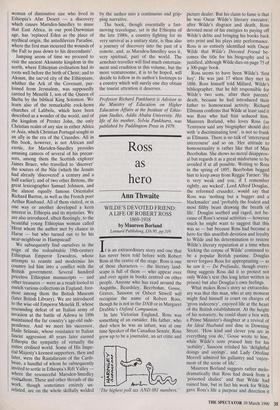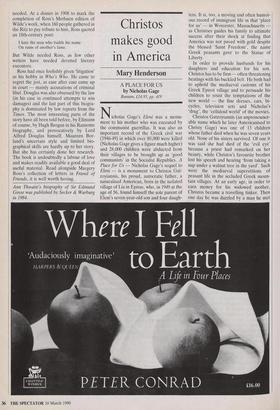Ross as hero
Ann Thwaite
WILDE'S DEVOTED FRIEND: A LIFE OF ROBERT ROSS 1869-1918 by Maureen Borland
Lennard Publishing, £16.95, pp.319
It is an extraordinary story and one that has never been told before with Robert Ross at the centre of the stage. Ross is one of those characters — the literary land- scape is full of them — who appear over and over again in books centred on other people. Anyone who has read around the Asquiths, Beardsley, Beerbohm, Gosse, Graves, Sassoon or Osbert Sitwell will recognise the name of Robert Ross, though he is not in the DNB or in Margaret Drabble's Oxford Companion.
In late Victorian England, Ross was something of an outsider. His father, who died when he was an infant, was at one time Speaker of the Canadian Senate. Ross grew up to be a journalist, an art critic and `The highest poll tax AND 081 numbers.' picture dealer. But his claim to fame is that he was Oscar Wilde's literary executor; after Wilde's disgrace and death, Ross devoted most of his energies to paying off Wilde's debts and bringing his books back into print and his plays into performance. Ross is so entirely identified with Oscar Wilde that Wilde's Devoted Friend be- comes the title for his biography and is justified, although Wilde dies on page 75 of a 300-page book.
Ross seems to have been Wilde's 'first boy'. He was just 17 when they met in 1886. Ross himself told Millard, Wilde's bibliographer, that he felt responsible for Wilde's two sons, after their parents' death, because he had introduced their father to homosexual activity. Richard Ellmann confirms that Wilde at least said it was Ross who had first seduced him. Maureen Borland, wh loves Ross (as Tennyson said any biogrlapher should do) with 'a discriminating lovle', is not so frank as Ellmann. There is no talk of Intercrural intercourse' and so on. Her attitude to homosexuality is rather like that of Max Beerbohm. She shows no moral disapprov- al but regards it as a great misfortune to be avoided if at all possible. Writing to Ross in the spring of 1895, Beerbohm begged him to keep away from Reggie Turner: 'He is very weak and you, if I remember rightly, are wicked'. Lord Alfred Douglas, the reformed crusader, would say that Ross was 'nothing but a bugger and a blackmailer' and 'probably the foulest and most filthy beast drawing the breath of life.' Douglas seethed and raged, not be- cause of Ross's sexual activities — however much he might want to suggest that this was so — but because Ross had become a hero for this unselfish devotion and loyalty to Wilde and his determination to restore Wilde's literary reputation at a time when 'kicking the corpse of Wilde' continued to be a popular British pastime. Douglas never forgave Ross for appropriating — as he saw it — De Profundis, though every- thing suggests Ross did it to protect not only Wilde's text (his long letter written in prison) but also Douglas's own feelings.
What makes Ross's story so extraordin- ary was that this man, who at any moment might find himself in court on charges of `gross indecency', enjoyed life at the heart of the British establishment. At the height of his notoriety, he could share a box with a Prime Minister's daughter at a revival of An Ideal Husband and dine in Downing Street. 'How kind and clever you are in everything you do,' Gosse wrote to him, while Wilde's sons praised him for his `nobility', Sassoon relished his 'delightful doings and sayings', and Lady Ottoline Morrell admired his gallantry and 'enjoy- ment of the scene of life'.
Maureen Borland suggests rather melo- dramatically that Ross had drunk from a `poisoned chalice' and that Wilde had ruined him, but in fact his work for Wilde gave Ross's life a purpose and direction it needed. At a dinner in 1908 to mark the completion of Ross's Methuen edition of Wilde's work, when 160 people gathered in the Ritz to pay tribute to him, Ross quoted an 18th-century poet:
I hate the man who builds his name On ruins of another's fame.
But Wilde needed Ross, as few other writers have needed devoted literary executors.
Ross had once foolishly given 'litigation' as his hobby in Who's Who. He came to regret the jest, as case after case came up in court — mainly accusations of criminal libel. Douglas was also obsessed by the law in his case in continued attempts to win damages) and the last part of this biogra- phy is dominated by law reports from the Times. The most interesting parts of the story have all been told before, by Ellmann of course, by Hugh Brogan in his Ransome biography, and provocatively by Lord Alfred Douglas himself. Maureen Bor- land's uncertain style and limited bio- graphical skills are hardly up to her story. But she has certainly done her research. The book is undoubtedly a labour of love and makes readily available a good deal of useful material. Read alongside Margery Ross's collection of letters in Friend of Friends, it is well worth having.
Ann Thwaite's biography of Sir Edmund Gosse was published by Secker & Warburg in 1984.



























































 Previous page
Previous page